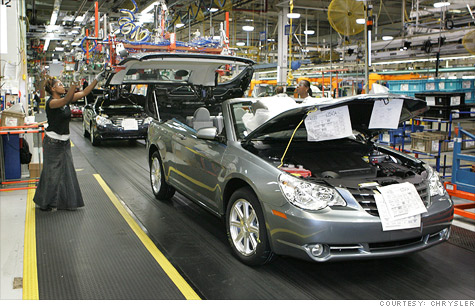
Yes, the U.S. government will lose money on the auto industry bailout. But, in return, we saved jobs and got an auto industry that's finally ready to compete.
NEW YORK (CNNMoney) -- Including the $1.3 billion loss on its Chrysler investment, announced Thursday, the United States government has lost about $14 billion on the auto industry bail-out. All in all, it was a bargain.
That $14 billion figure is far less than than the $40 billion bath the Congressional Budget Office expected U.S. taxpayers to take in the total auto industry bailout.
Saying the U.S. taxpayer "lost money" is probably the wrong perspective, considering that spending no money at all likely would have meant a financial catastrophe for millions of Americans far in excess of a mere $14 billion.
Had GM and Chrysler collapsed, it would have cost the federal government about $28.6 billion in lost tax revenues and assistance to the unemployed in just the first two years alone, according to the Michigan-based Center for Automotive Research. In other words, doing nothing could have cost more than twice as much the bailout.
By the way, that $28.6 billion figure doesn't include the business taxes the federal government would have lost but can now expect from two large, profitable automakers and their suppliers. It also doesn't include any lost state and local tax revenue.
At any rate, the federal government didn't become involved in lending money to Chrysler, General Motors (GM, Fortune 500) and others in the auto industry in order to make a profit. Had that been the goal, the Treasury Dept. should have bought Google (GOOG, Fortune 500) stock, instead.
No, the government stepped in to secure a pillar of American industry that was in the process of disintegrating. In the year leading up to the Chrysler and General Motors' bankruptcies, the auto industry lost 400,000 jobs. Since the bailout, about 113,000 of those jobs have been recovered, according to the Treasury Department.
A 2009 Center for Automotive Research report put the potential job losses if GM and Chrysler had been allowed to fail at more than 1 million in the first year, alone.
That's because the auto industry is complex and deeply interconnected in a way few other industries are. Thousands of parts are used to build one automobile. Those parts are generally made and supplied to the automakers by a constellation of smaller companies. If an automaker goes down, so do the hundreds of dependant companies with thousands of employees. This is not to mention the auto dealerships that are a sources of jobs and tax revenue in communities across America.
There can be no question that America's auto industry is far better off today thanks to the bail-out. Both General Motors and Chrysler are profitable even at today's relatively low rate of auto sales and their sales are rising.
In a good sign for the future, both automakers are getting positive reviews for their new products, exactly what's needed to keep things moving in the right direction.
Instead of failing and dragging a big chunk of America's economy down with it, GM says it has has hired 15,720 people since the bail-out and has invested $5.4 billion in the U.S.
Chrysler, meanwhile, reports it has hired 6,000 and invested $3.2 billion.
In the end, the $14 billion loss may well have been a small price to pay for a strong American auto industry that can finally succeed on its own merit.
The opinions expressed in this commentary are solely those of Peter Valdes-Dapena. ![]()